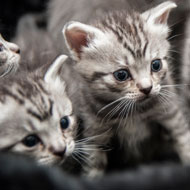
Currently there is no legislation in the UK specific to the breeding of cats for sale
The first ever proposals for laws on commercial cat breeding and cat welfare have been introduced in Parliament.
The Welfare of Cats Bill was introduced as a Private Members Bill to the House of Lords yesterday by Lord Black of Brentwood.
Currently there is no legislation in the UK specific to the breeding of cats for sale, and if passed by Parliament, the Bill would improve the welfare of breeding cats and their kittens.
Proposals include:
- Inspection and licensing of cat breeders
- Banning licensed breeders from allowing cats to have kittens before they are a year old
- Limiting the number of litters bred from a female cat to one a year, and no more than three in her lifetime
- Ensuring kittens are well socialised and healthy before they are sold
The proposals to regulate breeding of cats for profit have been welcomed by Cats Protection.
Jacqui Cuff, Cats Protection's advocacy manager, said the law governing the sale of pets dates back to the 1950s.
"New law is needed to protect cats from being bred and rebred for money as breeding machines," she said. "Repeated breeding is very draining and can be harmful for the mother cat. We know that the health and welfare of cats and kittens can be put at risk when there is a commercial interest in breeding for sale."
She continued: “We hope that regulation will deter those who, motivated by money, add yet more cats and kittens to an already saturated market. Breeding adds to the thousands of unwanted cats and kittens that are in the care of charities such as Cats Protection awaiting a loving home.”
To view the full Welfare of Cats Bill, visit http://services.parliament.uk/bills/?group=date&order=desc



 The Veterinary Medicines Directorate (VMD) is inviting applications from veterinary students to attend a one-week extramural studies (EMS) placement in July 2026.
The Veterinary Medicines Directorate (VMD) is inviting applications from veterinary students to attend a one-week extramural studies (EMS) placement in July 2026.